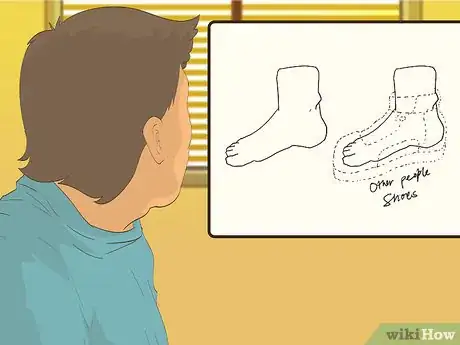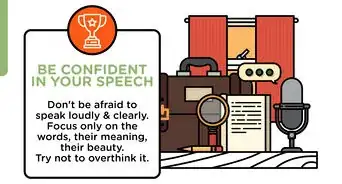This article was co-authored by Sandra Possing and by wikiHow staff writer, Christopher M. Osborne, PhD. Sandra Possing is a life coach, speaker, and entrepreneur based in the San Francisco Bay Area. Sandra specializes in one-on-one coaching with a focus on mindset and leadership transformation. Sandra received her coaching training from The Coaches Training Institute and has seven years of life coaching experience. She holds a BA in Anthropology from the University of California, Los Angeles.
There are 8 references cited in this article, which can be found at the bottom of the page.
This article has been viewed 58,682 times.
Once you’ve said them, words are like the genie that won’t go back into the bottle. You can try to clarify, justify, or apologize all you want, but what has been said can’t be un-said. Therefore, it is far better to catch yourself before you say something you’ll regret, and to take the time to say what you mean in the way you mean to say it.
Steps
Thinking Before You Speak
-
1Work on your listening skills. On a basic level, spending more time listening leaves you less time to talk, which can be helpful if you tend to blather on. On a deeper level, though, being an engaged, active listener will also help change the other person’s perception of the things you do say, putting you in a more positive light.[1] To become an active listener, try to, for example:
- Make eye contact; face the other person; adapt to their body language; nod as a sign of engagement
- Ask probing, leading, or reflective questions
- Paraphrase what they’ve just said before beginning your response
- Allow for pauses and periods of silence[2]
-
2Close your mouth when it opens. If you tend to speak without thinking, your mouth probably opens up and words come pouring out before you even realize it. Practice focusing on recognizing when your mouth opens to speak, and literally close it. Reopen it on your time, on your terms, once you’ve thought about what you want to say.[3]
- A thoughtful pause is a good thing in a conversation, especially if it keeps you from putting your foot in your mouth with a foolish comment.
Advertisement -
3Put yourself in the other person’s shoes. Sometimes the simplest advice is the hardest to follow, but this one is worth the effort. How would you feel if someone said to you what you are about to say? Would you understand that they “were only being honest” or “ were just trying to be helpful” or “didn’t mean it in that way?”[4]
- If you wouldn’t want someone to say the same thing to you, or say it in the same way, then keep your comment to yourself.
-
4Ask yourself if what you intend to say is true, necessary, and kind. This rubric about when to speak or not speak builds in part on the old “If you can’t say something nice, don’t say anything at all.” Unless what you are inclined to say is entirely accurate AND is important AND can be phrased politely, silence is usually the better option.[5]
- For example, “Your underwear is showing because those pants are too tight for you” will always fail at least one of the three categories; “I think you may have a wardrobe issue that needs addressed” might be okay depending on the circumstances. But it’s probably most often best to say nothing at all in this situation.
-
5Speak freely but not thoughtlessly with loved ones. Especially when you’re speaking with your partner, close friends, or family, you probably make unconscious assumptions that they’ll “get your meaning” and forgive you for being coarse or blunt. While the people that know and care about you probably are more willing to tolerate your verbal gaffes and spears, that doesn’t mean they should have to.[6]
- Stop and think — would you say the same thing, in the same way, to a new acquaintance or to your partner on your first date?
- Instead of “Boy, you’re starting to get pudgy!”, stop, think, and try something like “I think we should work together on eating healthier.”
-
6Take ownership of your statements by prefacing them. Get into the habit of starting comments by saying things like “In my opinion...” or “The way I see it...”. As simple as it sounds, using a preface like this can act as a quick reality check — one that urges you to confirm to yourself that this is what you believe, what you want to express, and how you want to say it.[7]
-
7Make an effort to become more articulate. Phrasing and delivery go a long way towards determining the listener’s reaction to what you say, and their overall perception of you. Put some effort into expanding your vocabulary through study; avoiding overuse of contractions and slang terms; speaking slowly and clearly; cutting out verbal pauses such as “like” and “um”; and exuding confidence (but not overconfidence) as you speak.
- Watch videos of engaging, articulate public speakers and take note of their speech patterns, body language, and so on.
- Evaluate your audience and tailor your phrasing and delivery to suit it.
Being More Tactful and Considerate
-
1Deflect or avoid sensitive subjects. Instead of getting dragged into a conversation you’d rather avoid or feeling goaded into saying something you’ll instantly regret, tactfully evade or change the topic of conversation.
- Plead ignorance: “I’m sorry, I don’t know Joe well enough to say anything about how he spends his free time.”
- Correct others gently: “As far as I know, that was just a rumor.”
- Change the subject: “Speaking of (politician X), did you notice how many campaign ads there were during last week’s game? — but wow, what a game that was!”
- Be direct but polite: “Sorry, but I’m not really comfortable talking about this. Do you mind if we change the subject?”
-
2Use a “feedback sandwich” to provide constructive criticism. It’s not inherently rude to tell someone they’ve done something wrong or need to change or improve upon something — in fact, it’s usually helpful and often necessary. But the manner in which you provide criticism will go a long way towards determining how it is received.
- Start with a compliment: “Thanks so much for helping clean up after dinner, without my even asking!”
- Follow with your critique: “However, you need to remember to ask before picking up knives and other sharp or dangerous things.”
- End on a positive note: “It really is amazing how helpful and mature you’re becoming!”[8]
-
3Consult the “ring theory” in traumatic circumstances. Basically, if someone is facing a very difficult situation — like the end of a long-term relationship or a cancer diagnosis — you should make the conversation all about their needs and not at all about how you’re being affected.[9]
- Imagine a series of circles (or “rings”) within circles, with the smallest circle representing the person most directly affected by the trauma in question.
- If you want to complain or vent, you should only do so to someone who is situated on a bigger “ring” (and thus, less directly affected) than you. If you’re talking to someone on a smaller ring, offer only comfort and support.
Limiting Undue Criticisms and Offensive Remarks
-
1Depersonalize the situation. If you’re in the habit of giving overly critical and unwarranted comments, the problem may be that you personalize events that have little or nothing to do with you.[10]
- For instance, don’t jump to the conclusion that your friend left the inside of their car a mess to annoy you, or that they canceled plans because they don’t value your time. Take a moment to consider the larger situation before deciding it’s justified for you to be critical.
- Similarly, don’t conflate a person’s character with a single action. Your neighbor letting their grass grow too long doesn’t necessarily mean they’re rude or a slob — maybe their lawnmower is broken. And maybe you could offer to lend your mower instead of offering criticism.
-
2Use “I” statements. On the surface, there might not seem to be much difference between saying “You don’t listen to me anymore” and “I don’t feel like I’m being heard anymore.” However, using “you” language figuratively points a finger at the other person and puts them on the defensive against criticism. “I” language keeps the focus on your feelings and perceptions.
- “Why won’t you ever help me around the house?” sounds and feels more like criticism than “I could really use some help with the housework today.”
-
3Keep up-to-date on terminology and contexts. Even if you grew up in an era when different terms were used to refer to various individuals and groups, you shouldn’t expect a pass if you use terms now deemed insensitive, outdated, or offensive. Of course, there’s no single rulebook for “good” and “bad” terms and context plays an important role, so don’t be afraid to politely ask someone about proper terminology or word usage.
- Accept, though, that you'll still slip up sometimes. Say, for example, you offend someone you assumed was "foreign" by asking “So, where are you from?” or “Wow, you speak great English!” Instead of getting defensive, apologize and work on not repeating the mistake.
Expert Q&A
-
QuestionHow do I not say what I think?
 Sandra PossingSandra Possing is a life coach, speaker, and entrepreneur based in the San Francisco Bay Area. Sandra specializes in one-on-one coaching with a focus on mindset and leadership transformation. Sandra received her coaching training from The Coaches Training Institute and has seven years of life coaching experience. She holds a BA in Anthropology from the University of California, Los Angeles.
Sandra PossingSandra Possing is a life coach, speaker, and entrepreneur based in the San Francisco Bay Area. Sandra specializes in one-on-one coaching with a focus on mindset and leadership transformation. Sandra received her coaching training from The Coaches Training Institute and has seven years of life coaching experience. She holds a BA in Anthropology from the University of California, Los Angeles.
Life Coach Spend more time listening to the other person than you spend talking so you hear what they have to say instead.
Spend more time listening to the other person than you spend talking so you hear what they have to say instead.
References
- ↑ Sandra Possing. Life Coach. Expert Interview. 15 July 2020.
- ↑ https://psychcentral.com/lib/become-a-better-listener-active-listening/
- ↑ http://www.chvbv.ca/think-before-you-speak/
- ↑ https://www.psychologytoday.com/blog/rediscovering-love/201105/speaking-you-think-foot-in-mouth-syndrome-in-committed-relationships
- ↑ http://www.chvbv.ca/think-before-you-speak/
- ↑ https://www.psychologytoday.com/blog/rediscovering-love/201105/speaking-you-think-foot-in-mouth-syndrome-in-committed-relationships
- ↑ https://www.forbes.com/sites/francescadonner/2010/08/19/watch-what-you-say-jennifer-aniston-live-with-regis-and-kelly/#3b03bc740fac
- ↑ http://www.rightattitudes.com/2008/02/20/sandwich-feedback-technique/
- ↑ http://articles.latimes.com/2013/apr/07/opinion/la-oe-0407-silk-ring-theory-20130407








































































